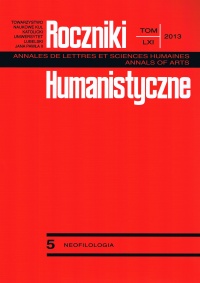Principles of Equivalent Selection in English Prose Translations of Jerome’s Psalters: A Study Based on exaudire and videre
Abstract
The paper examines the equivalents of the Latin verbs exaudire and videre in prose translations of Jerome’s Psalters executed between Old and Early Modern English. The objective of the paper is to establish the principle of equivalent selection in the analysed texts. The study revealed that exaudire and videre were translated in OE, ME and EMnE by their prototypical equivalents but the prototypes changed due to language internal factors: from prefixed ge-verbs (ge-hȳran and ge-sēon ) to their simplex equivalents (hēren > hear and sēn > see). Next, it was established that while the equivalents of exaudire represented a stable pattern: ge-hȳran > hēren > hear, the equivalents of videre tended to exhibit some variation. The variation, however, was recorded in one translation only – in the Paris Psalter. These differences stem from two factors. The first of them is language internal and follows from the universally recorded property of the verb see, which tends to develop metaphorical meanings, as opposed to hear, which does not exhibit the same tendency. The second factor is language external and is a consequence of the dominant theory of biblical translation, which was based on the principle that every word of the text was sacred. As a result, biblical translations generally reflected the original very closely. The only text which exhibits dynamic correspondences is the Old English Paris Psalter, which focuses on the clarity of the message not on the closeness of the rendering. The remaining translations are characterised by extreme reverence to the sacred nature of the text in all its layers, which results in the static equivalent selection.
References
Bosworth, Joseph and Thomas Northcote Toller. (1898). An Anglo-Saxon Dictionary Based on the Manuscript Collections of the Late Joseph Bosworth, Edited and Enlarged by T. Northcote Toller. London: Clarendon Press.
Bramley, Henry Ramsden (ed.). (1884). The Psalter, or Psalms of David and Certain Canticles with a Translation and Exposition in English by Richard Rolle of Hampole. Edited from Manuscripts. Oxford: Clarendon Press. [online] http://quod.lib.umich.edu/cgi/t/text/text-idx?c=cme;cc=cme;view=toc;idno=AJF7399.0001.001
Bright, James Wilson and Robert Lee Ramsay (eds.). (1907). Liber Psalmorum: the West-Saxon Psalms Being the Prose Portion, or the ‘First Fifty,’ of the So-Called Paris Psalter. Edited from the Manuscript, with an Introduction and an Appendix. Boston, MA and London: D.C. Heath and Co.
Brown, George Hardin. (1999). The psalms as the foundation of Anglo-Saxon learning. In Nancy Elizabeth van Deusen (ed.). The Place of the Psalms in the Intellectual Culture in the Middle Ages. Albany, NY: State University of New York Press. 1-24.
Bülbring, Karl Daniel. (ed.). (1891). The Earliest Complete English Prose Psalter together with Eleven Canticles and a Translation of the Athanasian Creed. Edited from the Only Two MSS. in the Libraries of the British Museum and of the Trinity College, Dublin with Preface, Introduction, Notes and Glossary. London: Kegan Paul, Trench, Trubner and Co. [online] http://quod.lib.umich.edu/cgi/t/text/textidx?c=cme;cc=cme;view=toc;idno=BAA8159.0001.001
Charzyńska-Wójcik, Magdalena. (2013). Text and Context in Jerome’s Psalter. Prose Translations into Old, Middle and Early Modern English. Lublin: Wydawnictwo KUL.
Corpus of Middle English Prose and Verse. Ann Arbor, MI: University of Michigan Library. [online] http://quod.lib.umich.edu/c/cme/
Cunyus, John G. (2009). The Audacity of Prayer: A Fresh Translation of the Book of Psalms (Latin-English Edition). Glen Rose, TX: Searchlight Press.
Douay Bible = (1609-10). The Holie Bible Faithfvlly Translated into English, ovt of the Avthentical Latin Diligently Conferred with the Hebrew, Greeke, and Other Editions in Diuers Languages: with Argvments of the Bookes, and Chapters: Annotations: Tables: and Other Helpes, for Better Vnderstanding of the Text: for Discouerie of Corrvptions in Some Late Translations and for Clearing Controversies in Religion. Volume II. Doway: Lavrence Kellam. [online] http://archive.org/details/holiebiblefaithf02engl
Forshall, Josiah and Frederic Madden. (eds.). (1850). The Holy Bible, Containing the Old and New Testaments, with the Apocryphal Books, in the Earliest English Versions Made from the Latin Vulgate by John Wycliffe and His Followers. Oxford: University Press. [online] http://quod.lib.umich.edu/cgi/t/text/textidx?c=cme;cc=cme;view=toc;idno=AFZ9170.0001.001
Hargreaves, Henry. (1965). From Bede to Wyclif: medieval English Bible translations. Bulletin of the John Rylands Library 48: 118-140.
Harris, Stephen J. (2012). Happiness and the psalms. In Michael Fox and Manish Sharma (eds.). Old English Literature and the Old Testament. Toronto, ON: University of Toronto Press. 292-314.
Kastovsky, Dieter. (1992). Semantics and vocabulary. In Richard Milne Hogg (ed.). The Cambridge History of the English Language. Volume I: The Beginnings to 1066. Cambridge: Cambridge University Press. 290-408.
Paris Psalter = MS Bibliothèque Nationale Fonds Latin 8824. [online] http:// gallica.bnf.fr/ark:/ 12148/btv1b8451636f/f1.image.r=psalterium%20duplex.langEN
Schwartz, Werner. (1955). Principles and Problems of Biblical Translation: Some Reformation Controversies and Their Background. Cambridge: Cambridge University Press.
Toronto Corpus = Cameron, Angus and Roberta Frank. (eds.). Complete Corpus of Old English: the Toronto Dictionary of Old English Corpus. University of Toronto Centre for Medieval Studies. The Oxford Text Archive. [online] http://ota.ahds.ac.uk/
Copyright (c) 2013 Roczniki Humanistyczne

This work is licensed under a Creative Commons Attribution-NonCommercial-NoDerivatives 4.0 International License.





